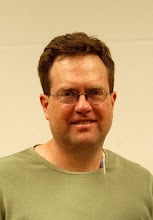 |
| The Bard |
The first was a joke (an obviously bawdy one) on the subject of BYU coeds; in fact, one could consider this my contribution to the "BYU coed joke" genre. It also tries to make a joke of the relative social status of scholars versus athletes at BYU (although anyone who's gone to school there knows the opposite standing is closer to the truth -- not to mention the fact that, on average, BYU coeds actually are, and always have been, quite attractive):
Scholar: "Why art thou, Sirrah, seeming pale and wan?
I deign to hazard one shrewd guess in haste:
This...B.Y.U. has put a bitter taste
Into thy mouth; from thine eyes light is gone
Because of hags as these, that o'er thee fawn."
Athlete: "Your Honor speaks aright; indeed, I've fac'd
Such sights and horrors as have never pac'd
The long, dark halls of sicken'd minds! Ah, sawn-
Away would I see these, my precious jew'ls--
And, yea, my with'ring-though-yet-worthy tools--
Before to such an evil-visag'd strumpet
Be giv'n unfetter'd use of this, my trumpet!"
Scholar: "What voids lie in the heads of bloody fools
Succumbing to the grov'llings of such ghouls?"
The second one is a lover's lament (it's funny how nothing in this world causes the muse to descend more than unrequited love), written to a girl who didn't merit nearly so much creative effort on my part:
The night elapses slow; my thoughts are drawn
To times now fading in dark shades of gray,
In which you might have brought me light of day,
But that your fleeting love was here and gone
In merest moments. Would I'd seen the dawn
That came to life a sunset; then I'd say
The girl I loved did take my pain away--
But you did not. Nor did you look upon
This soul as one whose pure, impassion'd love
Could take you to planes outside and above
Your mundane concept of fulfillment, joy;
Instead, to you I was a little boy.
Yet someday, say my feelings, I will prove
This love wind, rain, and darkness cannot move.
The third combines three sentiments: (1) my love for Dorine; (2) my struggles through the years to know God; and (3) my distaste for sanctimony and the corrosive effect it has on my faith:
In trusting childhood I have bared my soul
To you, my evergreen, resilient jade;
Break not the moods that cast their cooling shade
On lives tormented by the flaming coal
Of worldly cares. I strain to reach my goal
To rise and meet the God from whom I've strayed.
But, yet, we know us not, though He has made
His light, at times, to shine upon a knoll,
In fading shades that color Heaven's bowl
At twilight's dying last. I feel betrayed
By those who claim to know Him but would wade
In methods of ungodliness. What toll
Might He force me to pay, if I elect
To derogate the tenets of their sect?
The fourth reflects my love for hiking in the mountains, still one of my passions in life.
In coolest mountains I find youth anew--
The trail's the place to which I, hurried, run,
Encumber'd by the ghosts of deeds undone,
To cast aside a heavy load. I rue
The day in which inside an office zoo
I landed, longing for the shining sun,
Desiring water clear yet having none.
I dream of plunging into sky so blue
It nearly drowns me in its airy deep,
Of climbing on a winding path so steep
I lose my breath from effort and from awe.
Adventure waits, yet time reveals a flaw:
I'm stuck again inside this place, asleep,
With only longings in my heart to keep.
The last is, simply, a tribute to my father, written before his death:
My father--all your years have told a tale
Of simple values whose profound intent
No longer holds its place in people bent
On taking what they can from life, who rail
On moral others, thinking, without fail,
To give no answer for their lives misspent.
Responsibility--it came and went,
A concept cast aside like last week's mail.
And there you were to take a lion's share,
So much I'm struck at all you've had to bear.
Yet honor and integrity make light
A burden that would otherwise delight
A masochist's most fond, intense desire;
I pray the Lord to lift you ever high'r.





